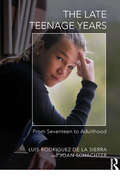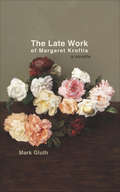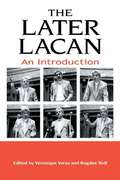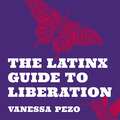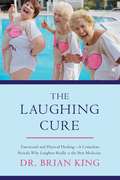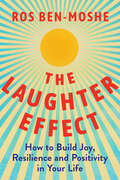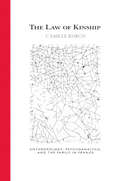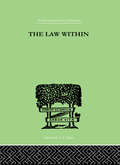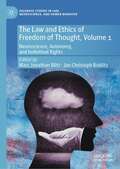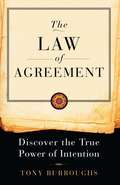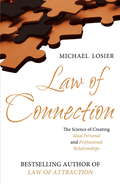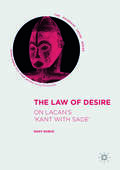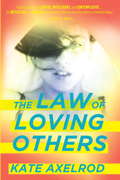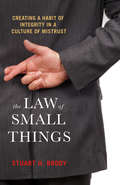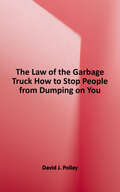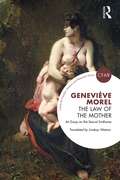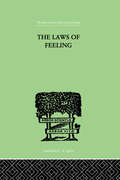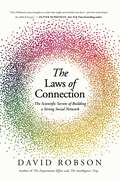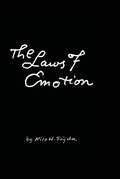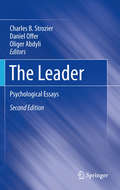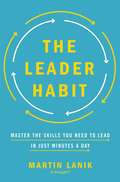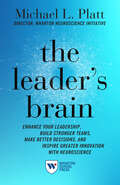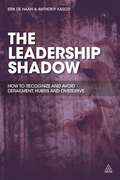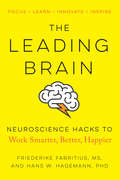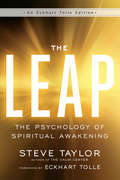- Table View
- List View
The Late Teenage Years: From Seventeen to Adulthood (The Karnac Developmental Psychology Series)
by Joan Schachter Luis Rodriguez SierraThe adolescent finds himself in the very difficult position of having to make all these readjustments whilst he has to deal with the subsequent conflicts and anxieties. The earlier passionate mixture of love and hatred that characterizes the attachment and dependency on the parents must now be renounced until the adolescent reaches a point at which it is possible for him to confirm his own identity and find new love relationships. These must neither be based too much on repetition of previous early attachments, nor be entirely and exaggeratedly opposed to them. It goes without saying that none of this can be achieved without much upheaval and experimenting. The step from adolescence to adulthood is complex and involves not only the individual's emotional experience, but also the continuous input, reactions from the world in which he/she lives. It is these interactions that are described and discussed in this book.
The Late Work of Margaret Kroftis: A Novella (Little House On The Bowery Ser.)
by Dennis Cooper Mark GluthA phenomenal debut novella to further establish the literary excellence of Dennis Cooper's Little House on the Bowery series."In The Late Work of Margaret Kroftis, Mark Gluth does something I've never seen another author do: he captures perfectly the feel of daydreams. Though everybody in the book daydreams, Gluth doesn't simply describe their thoughts; instead, he does something better and more brilliant--he infuses his words with the deceptive simplicity and surrealism of the fantasies we dream up for ourselves. Like daydreams, his book is brief but powerful; like daydreams, it is both heartbreakingly hopeful and heart-stoppingly honest. It's a reverie that's a revelation. It is great."--Derek McCormack, author of The Show that SmellsThe Late Work of Margaret Kroftis begins during the later days of Margaret Kroftis's life. She is a writer, living alone. As she experiences a personal tragedy the narrative moves forward in an emotionally coherent manner that exists separately from linear time. Themes of loss and grief cycle and repeat and build upon each other. They affect the text and create a complex structure of crosshatched narratives within narratives. These mirror each other while also telling unique stories of loss that are both separate from Margaret's as well as deeply intertwined.This groundbreaking debut demonstrates an affinity with the work of such contemporary European writers as Agota Kristof and Marie Redonnet, while existing in a place and time that is uniquely American. Composed in brief paragraphs and structured as a series of vignettes, pieces of fiction, and autobiography, The Late Work of Margaret Kroftis creates a world in which a woman's life is refracted through dreamlike logic. Coupled with the spare language in which it is written, this logic distorts and heightens the emotional truths the characters come to terms with, while elevating them beyond the simply literal.Mark Gluth's writing has previously appeared in the anthology Userlands (Akashic, 2007) and Ellipsis magazine. He was born in Cleveland, Ohio and now lives in Bellingham, Washington with his wife and their two dogs.Dennis Cooper's (series editor) novels have been translated into eighteen foreign languages. He has guest-edited sections of fiction and nonfiction for BookForum, Nerve, the L.A. Weekly Literary Supplement, and the Village Voice Literary Supplement. He is a contributing editor of ArtForum magazine and lives in Los Angeles.
The Later Lacan: An Introduction (SUNY series in Psychoanalysis and Culture)
by Bogdan Wolf Veronique VoruzExamines fundamental concepts of the later Lacan. This book includes essays by some of the finest practicing analysts and teachers of psychoanalysis in the Lacanian community today. The writings offer an essential introduction to the later teachings of Jacques Lacan, illuminate the theoretical developments introduced by the later Lacan, and explore their clinical implications with remarkable acumen. “There are few books devoted to the later Lacan. This book will be consulted regularly as a reference point for those Anglophones who continue to follow Lacanian teaching in order to articulate what it means to have a subject of the unconscious. Lacan is not going away and books like this keep the knowledge living in dialogue with its clinical context.” — Kareen Malone, coeditor of After Lacan: Clinical Practice and the Subject of the Unconscious “It is momentous to have, after nearly a decade, a book that features so many of the most eminent members of the École de la Cause Freudienne. None of the essay collections on Lacan that have been published have made available the highly significant, ongoing work of this French school in English.” — Maire Jaanus, coeditor of Lacan in the German-Speaking World Véronique Voruz is a Lacanian Psychoanalyst and Lecturer in Law and Criminology at the University of Leicester, United Kingdom. Bogdan Wolf is a Lacanian Psychoanalyst practicing in London, United Kingdom.
The Latinx Guide to Liberation: Healing from Historical, Generational, and Individual Trauma
by Vanessa Pezo"Let us heal together. But first I invite you to take a breath."The impact of colonialism, generational trauma, and individual trauma is often disregarded in the Latinx community. This pioneering guide addresses this trauma and takes Latinx readers on a journey of healing and liberation.. It explores what it means to have been systematically oppressed, how it impacts us, and how to change it. In doing so, this book challenges stereotypes, unravels the shame-based narratives around Latinx mental health, and refocuses the conversation around cultural empowerment, awareness, and transformation.Each chapter is enriched with historically informed psychoeducation regarding the impact of various types of trauma on Latinx mental health. It also includes reflection questions and healing exercises to help readers process how they, their families, and communities have been impacted.Accessible and interactive, this is an invaluable resource for Latinx people and mental health professionals working within the Latinx community.
The Laughing Cure: Emotional and Physical Healing—A Comedian Reveals Why Laughter Really Is the Best Medicine
by Brian KingDr. Brian King is a psychologist and stand-up comedian whose humor therapy seminars are attended by more than ten thousand people each year. In The Laughing Cure, King combines wit with medical research to reveal the benefits of laughter and humor on physical and emotional health. King’s language is humorous and uplifting, and his advice is backed in science. The Laughing Cure features clinical studies and interviews with some of the nation’s top doctors that prove that laughter lowers blood pressure, reduces stress hormones, increases muscle flexion, boosts immune systems, and triggers endorphins. It’s been shown to relieve depression, to produce a general sense of wellbeing, even to make us more productive, loving, and kind.The Laughing Cure presents step-by-step guidance and proven techniques to embrace laughter as both medicine for current conditions and preventative medicine. This highly unique and enjoyable read explains why much-talked about, but little understood methods of therapy like those embraced by acclaimed humor doctor Patch Adams—played by Robyn Williams in a 1998 film—and laughter yoga actually work. Growing up, King wanted to be a stand-up comic; his PhD. was his backup plan. Little did he know, the impact his unique situation would put him in, the way it would allow him to help others. Very few doctors have the ability to heal the way that King does; his method is cheap, easy, chemical-free—even fun. With The Laughing Cure, readers will learn how—and why—laughter saves lives.
The Laughter Effect: How to Build Joy, Resilience, and Positivity in Your Life
by Ros Ben-MosheLaughter really can be the best medicine, and in this transformative body-mind guide, acclaimed wellness expert Ros Ben-Moshe shares the prescription.In The Laughter Effect, Ros Ben-Moshe provides a roadmap to tap into the lighter side of life with laughter therapy. Ben-Moshe shares tips and tools to achieve an intentional state of being she calls the Laughter Effect–a way to elevate mindfulness, gratitude, and self-compassion. When used regularly, it enhances resilience to stress, enabling you to respond to adversity and bounce forward with humor, levity, and grace. Drawing on research from around the world, practice and wisdom from humor and laughter therapy, and positive psychology and neuroscience, Ben-Moshe shows you how to use the energy of laughter and joy to counter stress hormones and stimulate a daily dose of positive wellbeing with &“happy hormones.&”The techniques, strategies and practices you&’ll learn can transform your physical, mental, social and emotional landscape. Viewing life through a laughter lens will awaken a positive change in yourself, how you respond to the world and, in turn, how the world responds to you.
The Law Of Kinship
by Camille RobcisIn France as elsewhere in recent years, legislative debates over single-parent households, same-sex unions, new reproductive technologies, transsexuality, and other challenges to long-held assumptions about the structure of family and kinship relations have been deeply divisive. What strikes many as uniquely French, however, is the extent to which many of these discussions-whether in legislative chambers, courtrooms, or the mass media-have been conducted in the frequently abstract vocabularies of anthropology and psychoanalysis. In this highly original book, Camille Robcis seeks to explain why and how academic discourses on kinship have intersected and overlapped with political debates on the family-and on the nature of French republicanism itself. She focuses on the theories of Claude Levi-Strauss and Jacques Lacan, both of whom highlighted the interdependence of the sexual and the social by positing a direct correlation between kinship and socialization. Robcis traces how their ideas gained recognition not only from French social scientists but also from legislators and politicians who relied on some of the most obscure and difficult concepts of structuralism to enact a series of laws concerning the family. Levi-Strauss and Lacan constructed the heterosexual family as a universal trope for social and psychic integration, and this understanding of the family at the root of intersubjectivity coincided with the role that the family has played in modern French law and public policy. The Law of Kinship contributes to larger conversations about the particularities of French political culture, the nature of sexual difference, and the problem of reading and interpretation in intellectual history.
The Law Within (International Library Of Psychology Ser.)
by Fuller, BampfyldeFirst Published in 1999. Routledge is an imprint of Taylor & Francis, an informa company.
The Law and Ethics of Freedom of Thought, Volume 1: Neuroscience, Autonomy, and Individual Rights (Palgrave Studies in Law, Neuroscience, and Human Behavior)
by Marc Jonathan Blitz Jan Christoph BublitzFreedom of thought is one of the great and venerable notions of Western thought, often celebrated in philosophical texts – and described as a crucial right in American, European, and International Law, and in that of other jurisdictions. What it means more precisely is, however, anything but clear; surprisingly little writing has been devoted to it. In the past, perhaps, there has been little need for such elaboration. As one Supreme Court Justice stressed, “[f]reedom to think is absolute of its own nature” because even “the most tyrannical government is powerless to control the inward workings of the mind.” But the rise of brain scanning, cognition enhancement, and other emerging technologies make this question a more pressing one. This volume provides an interdisciplinary exploration of how freedom of thought might function as an ethical principle and as a constitutional or human right. It draws on philosophy, legal analysis, history, and reflections on neuroscience and neurotechnology to explore what respect for freedom of thought (or an individual’s cognitive liberty or autonomy) requires.
The Law of Agreement: Discover the True Power of Intention
by Tony BurroughsNo matter who you are or what you believe, you have the power to manifest what you want in life--a dream job, wealth, love, and health. In this concise and fascinating book, Tony Burroughs shows readers how to work with the Law of Agreement to change old beliefs about money, relationships, and health issues that are holding them back. He shares stories from his years of working with people from all over the world who are practicing living intentionally--bringing into their lives that which serves the higher good and discarding the rest. The Law of Agreementsays that as we lend our agreement to any belief, we reinforce it and make it stronger. Alternatively, as we refrain from lending our agreement to an idea that isn't likely to give us the results we're looking for; we dilute it and weaken its power over us and over everyone else simultaneously. Burroughs offers examples and stories which show how the Law of Agreement, and its partner, the Law of Adversity work simultaneously. What happens when we don't get what we want? What is the opportunity in adversity?The Law of Agreementshows how adversity can lift us up and out of our routines and help us to reach deep inside ourselves for answers to life's hardest questions. Full of real life stories, examples, and solutions,The Law of Agreementis a practical and world-changing book.
The Law of Connection: The Science Of Creating Ideal Personal And Professional Relationships
by Michael LosierSometimes changing only a few words can make all the difference; sometimes it's more than a few words. But whatever the nature of the negative or conflicted relationship, this book will help.Have you ever felt like partners or colleagues constantly misunderstand what you are saying to them? Do you and your partner go round in circles? As the bestselling Law of Attraction showed readers how to attract what they want, Law of Connection will show you how to break the cycle and really connect with everyone in your life - at work, at home and with friends. You will learn how to enhance your communication style to really get what you want out of your relationships, so you can ensure that the ones you attract will be harmonious, productive and profitable.
The Law of Desire
by Dany NobusThis book offers the first comprehensive discussion of Lacan's Kant with Sade, an essay widely recognised as one of his most important and difficult texts. Here, the reader will find a detailed roadmap for each section of the essay, including clarifications of the allusions, implicit borrowings and references in Lacan's text, unique insights into the essay's publication history, and a critical assessment of its reception. The author expertly defines key terms, explains complex theoretical arguments, and contextualises the work within a larger philosophical discourse. No prior knowledge of Lacan, Kant or Sade is assumed, allowing both newcomers and those who are well-versed in psychoanalysis, philosophy, and literary criticism to benefit from the book. This engaging book clears the path for a long overdue re-discovery and a proper appreciation of one of Lacan's most challenging works, inspiring a renewed debate on the significance of Lacanian psychoanalysis for moral philosophy and literary theory.
The Law of Loving Others
by Kate Axelrod"Kate Axelrod's atmospheric, intense book captures perfectly the heady feeling of being on the edge of adulthood, when the abstract concept of 'love' starts to have real and sometimes terrifying meaning and consequences." - Emily Gould, author of Friendship "THE LAW OF LOVING OTHERS . . . Hours after Emma returns home from boarding school, she realizes that her mom is suffering from a schizophrenic break. Suddenly, Emma's entire childhood and identity is called into question. COULD NOT BE DISCOVERED BY REASON, Desperate for answers, Emma turns to her boyfriend, Daniel. Will he love her even if she goes crazy too? But it's the lonely, brooding boy Emma meets while visiting her mother at the hospital who really understands Emma. Phil encourages Emma's reckless need for hurt and pain in the face of all this change and she is soon caught in a complicated spiral of loss and mistrust. BECAUSE IT IS UNREASONABLE." In the span of just one winter break, Emma's relationships alter forever and she is forced to see the wisdom in a line from Anna Karenina: "The law of loving others could not be discovered by reason, because it is unreasonable." A beautifully grounded coming-of-age novel, THE LAW OF LOVING OTHERS demands that the reader accept the main character, Emma, for who she is, while also creating deep sympathy for all that she is going through.
The Law of Small Things: Creating a Habit of Integrity in a Culture of Mistrust
by Stuart H. BrodyWe are living in a time when dishonesty and duplicity are common in our public institutions, our workplaces, and even in our personal relationships. But by recognizing and resisting the small, seemingly inconsequential ways we make moral compromises in our own lives, we can repair the tear in our social and moral fabric.The Law of Small Things begins with an IQ (Integrity Quotient) test designed to reveal the casual way we regard our promises and the misconceptions we have about acting truthfully. The book shows how most people believe that integrity is something we "just have" and that we just do, like a Nike commercial. It depicts these and other deceptions we deploy to appear to act with integrity without actually doing so. The Law of Small Things also exposes how our culture encourages breaches of integrity through an array of "permitted promise-breaking," a language of clichés that equates self-interest with duty, and the "illusion of inconsequence" that excuses small breaches with the breezy confidence that we can fulfill integrity when it counts. Brody challenges the prevailing notion that integrity is a possession you hold permanently. No one "has integrity" and no one is perfect in practicing it. What we have is the opportunity to uphold promises and fulfill duties in each situation that faces us, large and small. Integrity is a practice and a habit of keeping promises, the ones we make explicitly and the ones that are implied in all our relationships. Ultimately, developing skill in the practice of integrity leads us to knowledge of who we are--not in the way the culture defines us, but in the way we truly know ourselves to be.
The Law of The Garbage Truck: How To Respond To People Who Dump On You, and How To Stop Dumping On Others
by David J. PollayTwenty years ago, while riding in a New York City taxi, international keynote speaker and positive psychology leader David J. Pollay narrowly escaped a life-threatening car crash. The driver who almost caused the accident started yelling at the cab driver, who remarkably just smiled, waved, and wished him well. Pollay asked how the cabbie could remain so calm, and his response sparked the defining principle of The Law of the Garbage Truck: "Many people are like garbage trucks. They run around full of garbage, full of frustration, full of anger, and full of disappointment. And if you let them, they’ll dump it on you. So when someone wants to dump on you, don’t take it personally . . . move on." In this remarkable book, Pollay shows you how to apply his Law to achieve happiness and success in both your personal and professional lives. Since David published “The Law“ in his syndicated newspaper column six years ago, thousands of blogs have posted it, millions more have read it, and organizations worldwide have adopted it. And the numbers keep growing. Translated into nearly 50 languages, people from more than 100 countries have taken Davids “No Garbage Trucks! Pledge.” All over the world people remember the focusing metaphor of the garbage truck for what can be achieved in life by not staking success and happiness on the behavior of others. Powerful and easily understood, The Law of the Garbage Truck guides and inspires readers everywhere, every day.
The Law of the Mother: An Essay on the Sexual Sinthome (The Centre for Freudian Analysis and Research Library (CFAR))
by Geneviève MorelThe law of the mother is made up of words charged with pleasure and suffering that leave their mark on us in early childhood. In this groundbreaking book, Geneviève Morel explores whether it is possible for the child to escape subjection from this maternal law and develop their own sexual identity. <P><P>Through clinical examples and critical commentary, the book illustrates the range and power of maternal influence on the child, and how this can generate different forms of sexual ambiguity. Using a Lacanian framework which revises the classical idea of the Oedipus complex, the book is not only a major contribution to gender studies but also an invaluable aid to the clinician dealing with questions of sexual identity. The book avoids many of the moral and political prejudices that paralyse twenty-first century society, be they related to legislation on marriage, parentage or adoption, the status of "mental health", or the limits to the supposed ownership of the human body. <P><P>Insightful and revealing, The Law of the Mother will be of great interest to Lacanian psychoanalysts, as well as to researchers in the fields of gender studies and sexuality.
The Laws Of Feeling (International Library Of Psychology Ser.)
by Paulhan, FFirst Published in 1999. Routledge is an imprint of Taylor & Francis, an informa company.
The Laws of Connection: The Scientific Secrets of Building a Strong Social Network
by David RobsonThis groundbreaking study reveals how social connections are far more important than we thought, showing us the steps we can take to build better relationships and improve our lives.Social connection is as essential for our health and happiness as a balanced diet and regular exercise. It reduces our risk of stroke, heart disease, and Alzheimer&’s. It enhances our creativity and adds years to our life span. Yet many of us struggle to form strong and meaningful bonds—and the problem lies not with our personalities but with a series of cognitive biases that stop us from fulfilling our social potential. In The Laws of Connection, award-winning science writer David Robson describes the psychological barriers that lead us to keep others at a distance and offers evidence-based strategies to overcome them. Drawing on philosophy, neuroscience, and cutting-edge psychology, Robson introduces readers to new concepts such as the liking gap, the novelty penalty, the fast-friendship procedure, the beautiful mess effect, and the Japanese art of amae. Whether we are shy or confident, introvert or extrovert, we can all build deeper relationships. The Laws of Connection shows us how.
The Laws of Emotion
by Nico H. FrijdaThe Laws of Emotion is an accessible work that reviews much of the insightful new research on emotions conducted over the last ten years. It expands on the theory of emotions introduced in Nico Frijda’s earlier work and addresses a number of unanswered, basic problems on emotion theory. The author’s goal is to better understand the underlying psychological mechanisms of emotion. In this book, Professor Frijda also examines previously neglected topics of emotion such as determinants of emotional intensity, the duration of emotions, and sexual emotions. It touches on both evolutionary and neuroscientific explanations. The book begins by reviewing a number of principles governing emotion, or “the laws of emotion”. The author then examines the passionate nature of emotions and the motivational processes underlying them, and the nature and causes of pleasure and pain. Professor Frijda then explores the processes that lead to emotional arousal, including cognitive influences and why people care more about certain things than others. Emotional intensity is then discussed, including the often-neglected topic of the course of emotions over time. The book concludes with the author's insights into complex emotional domains such as sex, revenge, and the need to commemorate past events. The Laws of Emotion will appeal to social, cognitive, and developmental psychologists, social scientists, philosophers, and neuroscientists, as well as anyone interested in the workings of the mind. It also serves as a text for advanced courses in the psychology of emotions or the neuroscience of emotions.
The Leader
by Charles B. Strozier Daniel Offer Oliger AbdyliThis volume examines the lives of prominent leaders from ancient Greece to the present. It explores how these leaders imposed their individual missions and mystiques on others, thereby fulfilling , and sometimes creating, distinct needs in their followers.
The Leader Habit: Master the Skills You Need to Lead--in Just Minutes a Day
by Martin LanikIn leadership as in life, only practice makes perfect. Habits are powerful, and The Leader Habit offers a simple, original approach to dramatically improving even our weakest areas.Routines quietly undergird large portions of what we do and how we function. Habit formation can speed success in the workplace as well--even in complex areas like leadership. Leadership training expert and bestselling author Martin Lanik spotlights 22 essential leadership abilities, breaking them down into a series of small, learnable behaviors.In The Leader Habit, you will find:Compelling evidence on how habits shape our lives, and how leadership is simply a series of habitsContent based on original research that looks at 795 leaders across the globe, identifying 22 essential leadership skills and 79 micro-behaviors that make up those skillsSimple exercises to turn effective leadership behaviors into ingrained habits, along with clear cues that tell you when to practice eachA Leader Habit Quiz that assesses 6 personality traits and points to behaviors that you&’ll find most rewardingTips for staying motivated, avoiding procrastination, and sustaining progressThe book's simple formula focuses on developing one skill at a time: sell the vision, delegate well, innovate often, empower others, overcome resistance, build strategic relationships, focus on customers, listen actively, negotiate effectively, and more.Many of us aspire to great leadership by consuming books and training. However, unless you intentionally reinforce the right behaviors, results are fleeting. The Leader Habit builds the "muscle memory" to turn leadership skills into lasting habits.
The Leader's Brain: Enhance Your Leadership, Build Stronger Teams, Make Better Decisions, and Inspire Greater Innovation with Neuroscience
by Michael PlattA pioneering neuroscientist reveals how brain science can transform how we think about leadership, team-building, decision-making, innovation, marketing, and more.Leadership is a set of abilities with which a lucky few are born. They’re the natural relationship builders, master negotiators and persuaders, and agile and strategic thinkers.The good news for the rest of us is that those abilities can be developed. In The Leader’s Brain: Enhance Your Leadership, Build Stronger Teams, Make Better Decisions, and Inspire Greater Innovation with Neuroscience, Wharton Neuroscience Initiative director Michael Platt explains how. Over two decades as a professor and practitioner in neuroscience, psychology, and marketing, Platt’s pioneering research has deepened our understanding of how key areas of the brain work—and how that understanding can be applied in business settings. Neuroscience is providing answers to many of leadership’s most vexing challenges. In The Leader’s Brain, Platt explains: Why two managers, when presented with the same set of information, make very different decisions; Why some companies (Apple) build strong social and emotional connections with their customers and others do not (Samsung); How some of the most significant events in sports history, like the “Miracle on Ice,” contain insights for how to build a team; Why even some of the most visionary business leaders can make disastrous decisions, and how to fix that.The Leader’s Brain relates findings like these, and many more, to help enhance leadership in an ever-shifting world entering a “new normal.” In this fast-reading and engaging guide, you’ll gain actionable insights you can put into practice as a leader. You will also learn what’s going on in your team’s brains when they are working in sync with one another, how you can tweak your message delivery to make sure others hear you, how to encourage greater creativity and innovation, and much more.
The Leadership Shadow
by Erik De Haan Anthony KasoziIn today's fast paced, interconnected, and mercilessly competitive business world, senior executives have to push themselves and others hard. Paradoxically, to succeed as leaders, they also need to relate to others very well. Under stress and challenge, the qualities executives have relied on to get them to the top and to achieve outstanding results can overshoot into unhelpful drives that lead to business and personal catastrophes.The Leadership Shadow draws on the lived experience of executives to make sense of what actually happens when their drivers overshoot and they act out the dark side of leadership. It shows how executives can find stability in the face of uncertainty, resilience in the face of gruelling demand, and psychological equilibrium as a leader in the face of turbulence.
The Leading Brain: Powerful Science-Based Strategies for Achieving Peak Performance
by Friederike Fabritius Hans W. HagemannA cutting-edge guide to applying the latest research in brain science to leadership - to sharpen performance, encourage innovation, and enhance job satisfaction.There's a revolution taking place that most businesses are still unaware of. The understanding of how our brains work has radically shifted, exploding long-held myths about our everyday cognitive performance and fundamentally changing the way we engage and succeed in the workplace.Combining their expertise in both neuropsychology and management consulting, neuropsychologist Friederike Fabritius and leadership expert Dr. Hans W. Hagemann present simple yet powerful strategies for:- Sharpening focus- Achieving the highest performance- Learning and retaining information more efficiently- Improving complex decision-making- Cultivating trust and building strong teamsBased on the authors' popular leadership programs, which have been delivered to tens of thousands of leaders all over the world, this clear, insightful, and engaging book will help both individuals and teams perform at their maximum potential, delivering extraordinary results.From the Hardcover edition.
The Leap: The Psychology of Spiritual Awakening (An Eckhart Tolle Edition)
by Steve TaylorWhat does it mean to be enlightened or spiritually awakened? In The Leap, Steve Taylor shows that this state is much more common than is generally believed. He shows that ordinary people — from all walks of life — can and do regularly “wake up” to a more intense reality, even if they know nothing about spiritual practices and paths. Wakefulness is a more expansive and harmonious state of being that can be cultivated or that can arise accidentally. It may also be a process we are undergoing collectively. Drawing on his years of research as a psychologist and on his own experiences, Taylor provides what is perhaps the clearest psychological study of the state of wakefulness ever published. Above all, he reminds us that it is our most natural state — accessible to us all, anytime, anyplace.
